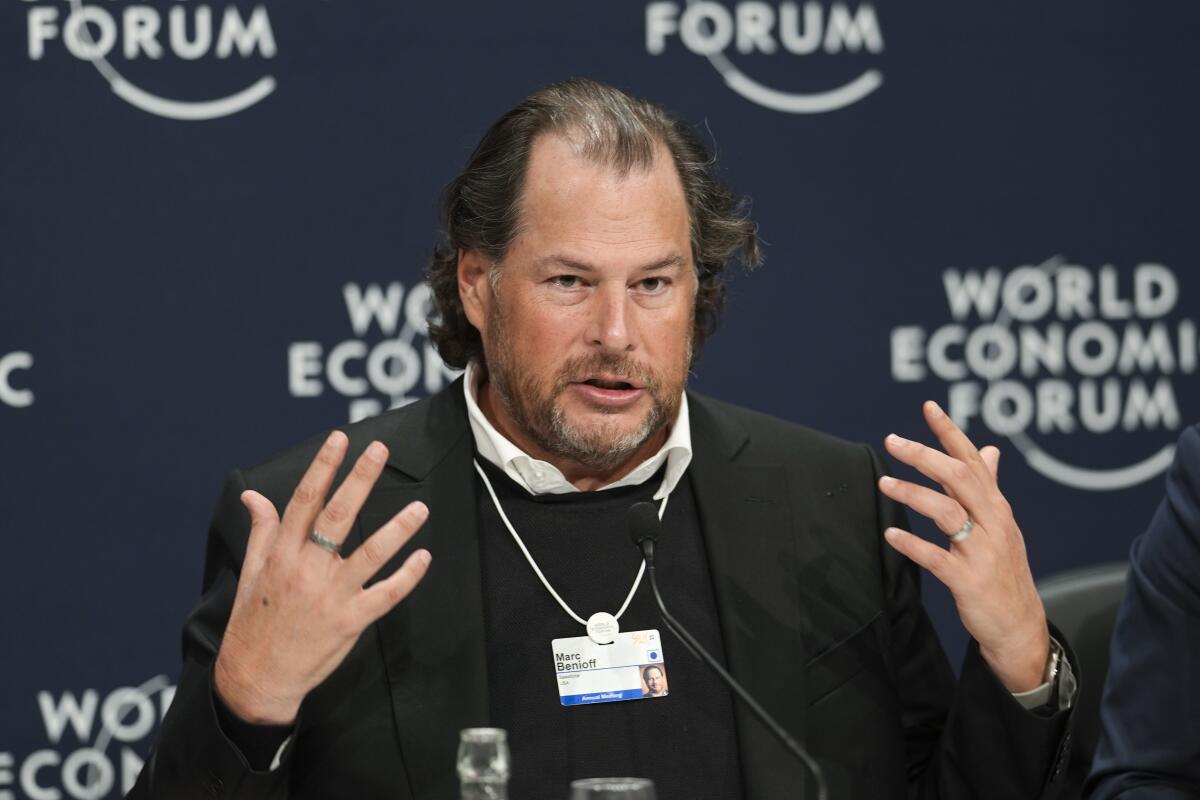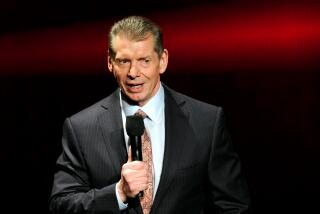Salesforce’s Marc Benioff is cashing out at rate of $3 million a day

- Share via
Marc Benioff’s cash pile grows a bit every day, thanks to a unique selling strategy unlike any other billionaire tracked by the Bloomberg Billionaires Index.
Since July, the Salesforce co-founder has been selling 15,000 shares of the software company’s stock — about $3 million worth — almost daily. Including a smaller selling streak earlier in the year, Benioff has unloaded more than $475 million worth of shares in 170 or so transactions.
His strategy of taking a little bit off the table every day dates to soon after Salesforce’s 2004 initial public offering, with Benioff making more than 200 sales the following year, records show. He’s continued the strategy since, which Benioff said helps fund charitable gifts to pediatric hospitals, public schools and medical research, among others.
“Business is the greatest platform for change,” Benioff, 59, said in a text message when asked about the stock sales. “This is why I love business because you can use it to improve the state of the world. That’s also why I love philanthropy.”
He also pointed to his ownership of Time magazine, a publication he purchased for $190 million in 2018.
Marc Benioff, the billionaire co-founder of software maker Salesforce.com Inc., is making a play to project his influence far beyond Silicon Valley with the purchase of Time magazine.
A chief executive officer selling hundreds of millions of dollars in stock can sometimes be a signal to investors or pose a legal risk, but Benioff’s approach is one of the “safest” ways to do it, said Alan Jagolinzer, a professor at Cambridge University’s Judge Business School.
It’s important for CEOs and other executives to diversify and unload some of their shares, but they run the risk of violating insider trading rules or influencing the stock price if done all at once, he said.
“That risk is significantly mitigated by trading every day because it subjects the sales to normal price movements,” Jagolinzer said. “Sometimes they trade advantageously and sometimes they don’t.”
Other billionaires vary their stock liquidation approaches, from disposing of large blocks to taking years off from selling. Meta Platforms’s Mark Zuckerberg unloaded $185 million worth of shares in a series of transactions in November, his first sales in two years, while Amazon.com co-founder Jeff Bezos hasn’t sold any shares since disposing of more than $20 billion worth across 2020 and 2021.
The closest billionaire super-seller to Benioff is Morningstar’s Joe Mansueto, who has sold shares almost 100 times this year and about 1,500 times since 2006. Still, Benioff’s more than 2,800 transactions over the same period dwarf Mansueto’s.
SAN FRANCISCO -- If you want to know how bad the tech backlash has gotten in this city, consider that the man who happens to run the city’s largest technology company has now joined the chorus of those criticizing the industry.
Many executives and insiders file statements known as 10b5-1 trading plans to signal in advance they’re going to sell shares in a prescribed time window and certify that the sales aren’t based on material nonpublic information. The plans allow executives to sell in a predictable pattern, which can minimize spooking other investors.
“The disadvantage is you can’t time things,” said Daniel Taylor, a professor at the University of Pennsylvania’s Wharton School, who researches CEO trading plans. “So if the stock price craters, you may be selling at a discount.”
That doesn’t mean the plans can’t be used strategically — as in the case of Salesforce’s leader.
Benioff was selling 5,000 shares a day in 2020, but increased it to 15,000 daily in the last quarter of that year as Salesforce’s stock price climbed, according to data from InsiderSentiment.com, which tracks insider sales. As the market slumped in 2022, he reduced his sales and only offloaded a few thousand shares a day. But by July 2023, as Salesforce’s stock price rose above $200, Benioff again ramped up his selling to 15,000 shares daily.
“This is a very intelligently designed trading system, which helps Benioff sell his stock at above-average prices and avoids any danger in entangling with legal issues,” said Nejat Seyhun, a finance professor at the University of Michigan’s Ross School of Business, who analyzed Benioff’s trades on InsiderSentiment.
Salesforce is laying off about 10% of its workforce in the latest round of job cuts in the tech industry as corporations cut back on software and other spending.
Benioff’s fortune has grown more than 55% in 2023 to $9.3 billion, according to the Bloomberg wealth index. He owns roughly 2.5% of the San Francisco-based company he founded in 1999, which makes up about two-thirds of his fortune with the balance in cash and other assets.
More to Read
Inside the business of entertainment
The Wide Shot brings you news, analysis and insights on everything from streaming wars to production — and what it all means for the future.
You may occasionally receive promotional content from the Los Angeles Times.











